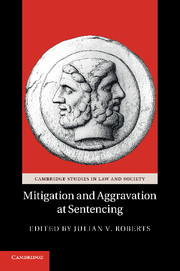Book contents
- Frontmatter
- Contents
- Tables
- Contributors
- Foreword
- Acknowledgments
- Chapter one Punishing, more or less
- Chapter two Re-Evaluating the Justifications for Aggravation and Mitigation at Sentencing
- Chapter three The Search for Principles of Mitigation
- Chapter Four Personal Mitigation and Assumptions about Offending and Desistance
- Chapter Five Intoxication as a sentencing factor
- Chapter Six Beyond the Partial Excuse
- Chapter Seven Equality before the law
- Chapter Eight Personal mitigation
- Chapter Nine Exploring Public Attitudes to Sentencing Factors in England and Wales
- Chapter Ten The Pernicious Impact of Perceived Public Opinion on Sentencing
- Chapter Eleven Addressing Problematic Sentencing Factors in the Development of Guidelines
- Chapter Twelve Proof of Aggravating and Mitigating Facts at Sentencing
- Chapter Thirteen Mitigation in Federal Sentencing in the United States
- Chapter Fourteen The discretionary effect of mitigating and aggravating factors
- Index
- References
Chapter one - Punishing, more or less
exploring aggravation and mitigation at sentencing
Published online by Cambridge University Press: 07 September 2011
- Frontmatter
- Contents
- Tables
- Contributors
- Foreword
- Acknowledgments
- Chapter one Punishing, more or less
- Chapter two Re-Evaluating the Justifications for Aggravation and Mitigation at Sentencing
- Chapter three The Search for Principles of Mitigation
- Chapter Four Personal Mitigation and Assumptions about Offending and Desistance
- Chapter Five Intoxication as a sentencing factor
- Chapter Six Beyond the Partial Excuse
- Chapter Seven Equality before the law
- Chapter Eight Personal mitigation
- Chapter Nine Exploring Public Attitudes to Sentencing Factors in England and Wales
- Chapter Ten The Pernicious Impact of Perceived Public Opinion on Sentencing
- Chapter Eleven Addressing Problematic Sentencing Factors in the Development of Guidelines
- Chapter Twelve Proof of Aggravating and Mitigating Facts at Sentencing
- Chapter Thirteen Mitigation in Federal Sentencing in the United States
- Chapter Fourteen The discretionary effect of mitigating and aggravating factors
- Index
- References
Summary
This volume explores an under-researched yet fascinating domain in the field of criminal sentencing: the circumstances that may justify imposition of a harsher or more lenient sentence. At sentencing, courts must weigh a wide range of offence and offender-related factors in order to determine the severity of the sentence. Some factors influence the sentence by affecting the seriousness of the crime, others because they reflect a higher or lower level of culpability on the part of the offender. Mitigating and aggravating factors are often taken for granted by members of the public (and possibly some legal professionals) – we all have intuitions about whether factor X should result in a more lenient or a harsher sentence. Certainly, for many factors the relevance is obvious: committing an assault against someone while disparaging their ethnicity or religious beliefs obviously makes the assault more serious; there is an additional element of harm (contained in the affront to the victim’s identity). Similarly, if, immediately after committing the crime the offender assists the victim, apologizes for his conduct and makes amends, this justifies a more lenient sentence. But many problematic circumstances exist.
- Type
- Chapter
- Information
- Mitigation and Aggravation at Sentencing , pp. 1 - 20Publisher: Cambridge University PressPrint publication year: 2011
References
- 5
- Cited by

